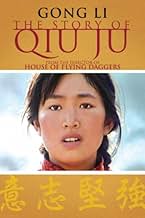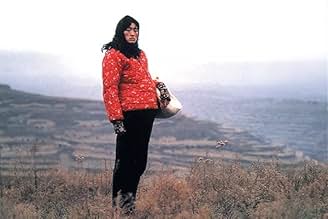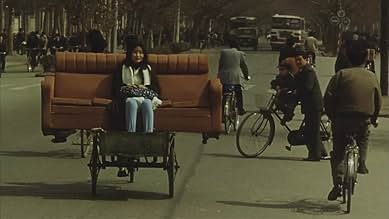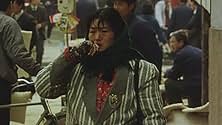IMDb रेटिंग
7.5/10
7 हज़ार
आपकी रेटिंग
अपनी भाषा में प्लॉट जोड़ेंA peasant woman seeks justice after the headman of her village has kicked her husband in the groin.A peasant woman seeks justice after the headman of her village has kicked her husband in the groin.A peasant woman seeks justice after the headman of her village has kicked her husband in the groin.
- पुरस्कार
- 19 जीत और कुल 9 नामांकन
फ़ीचर्ड समीक्षाएं
Most Chinese movies are about victims of the culture or political system or how beautiful you men and women are kept apart or forced together by forces outside their control. This movie is completely different. It is a simple story about the ordinary Chinese people you can meet on the street and in their homes today and their ordinary lives. It is an amazingly accurate portrayal, unlike anything I have seen before. I only spent 3 weeks in China, but this movie brought back the feel of China, its people, and organizations.
Qxi Ju wants an apology from the Chief of the commune for kicking her husband in the groin. This is a story about her travels from the commune to the big city to try to get action from various bureaucracies. Although she is treated kindly and with much respect by the bureaucrats, she never gets exactly what she wants. It is fun to watch naive country girl Qxi Ju quickly learn about master doing things in the big city.
For me, the plot in this movie is secondary. It is each of the simple scenes that make this movie wonderful: The doctor's office is heated by a wood stove and the doctor chops the wood and feeds the fire. Qxi Ju's sister gives here a ride to town on the back of her bicycle on a snow covered unpaved road. They use dried chili peppers to trade for money to get a ride to the next town. Qxi Ju negotiates for the price of each thing she buys. The scenes all seem so realistic and beautifully photographed.
Yimou Zhang also made "Raise the Red Lantern" which gets higher praise, but that movie is about a world that is harder for me to relate to. This movie is like real life and real people and China today.
Qxi Ju wants an apology from the Chief of the commune for kicking her husband in the groin. This is a story about her travels from the commune to the big city to try to get action from various bureaucracies. Although she is treated kindly and with much respect by the bureaucrats, she never gets exactly what she wants. It is fun to watch naive country girl Qxi Ju quickly learn about master doing things in the big city.
For me, the plot in this movie is secondary. It is each of the simple scenes that make this movie wonderful: The doctor's office is heated by a wood stove and the doctor chops the wood and feeds the fire. Qxi Ju's sister gives here a ride to town on the back of her bicycle on a snow covered unpaved road. They use dried chili peppers to trade for money to get a ride to the next town. Qxi Ju negotiates for the price of each thing she buys. The scenes all seem so realistic and beautifully photographed.
Yimou Zhang also made "Raise the Red Lantern" which gets higher praise, but that movie is about a world that is harder for me to relate to. This movie is like real life and real people and China today.
Really enjoyed this one. Qiu Ju is the wife of a man who has been kicked by a neighbor, his village chief. She presses for an apology, largely (if subtitles do it justice) because, even though his chest is what hurts longer, he's been kicked in the "privates" and she wants more than one child. She takes her quest for the apology up the chain of officialdom.
I couldn't get enough of the scenery - houses, city, carts, clothes, painted paper banners, dried peppers and corn - and the faces of people. As other viewers noted positively, the people in it didn't seem to be actors but real people, caught up in daily affairs and catching us up, too. The nearby village is somewhat familiar to her, but her trip to the city may have been her first. Watching her trying to find her way around, haggling for fair rates and help from a produce buyer, a bike-cart driver, a letter writer, a hotelier, and a lawyer was a lot of fun. Her trips seemed like a great introduction to the culture.
One of the things I loved was how the families and neighbors kept having complex interactions with each other throughout the ordeal. And the social roles in this were interesting: Farm/village chief to farmer, sister to sister, daughter-in-law to her in-laws, Party officials to their hierarchy and to citizens, country to city, women's role in general (as in what sex babies are preferred) and the strong stance of a specific woman like Qiu Ju, who seemed to be empowered as much as frustrated by the system and by her family and neighbors.
I read reviews of this as a negative comment on bureaucracy. If so, it showed a remarkably humane one. Flaws were on display but the overall tone was of acceptance.
The sudden ending left me feeling for the main characters. I seemed to see a judgment in it, but wasn't sure what that judgment was. I wanted to know how the story was interpreted in China, so I came to IMDB to at least see how others took it.
I couldn't get enough of the scenery - houses, city, carts, clothes, painted paper banners, dried peppers and corn - and the faces of people. As other viewers noted positively, the people in it didn't seem to be actors but real people, caught up in daily affairs and catching us up, too. The nearby village is somewhat familiar to her, but her trip to the city may have been her first. Watching her trying to find her way around, haggling for fair rates and help from a produce buyer, a bike-cart driver, a letter writer, a hotelier, and a lawyer was a lot of fun. Her trips seemed like a great introduction to the culture.
One of the things I loved was how the families and neighbors kept having complex interactions with each other throughout the ordeal. And the social roles in this were interesting: Farm/village chief to farmer, sister to sister, daughter-in-law to her in-laws, Party officials to their hierarchy and to citizens, country to city, women's role in general (as in what sex babies are preferred) and the strong stance of a specific woman like Qiu Ju, who seemed to be empowered as much as frustrated by the system and by her family and neighbors.
I read reviews of this as a negative comment on bureaucracy. If so, it showed a remarkably humane one. Flaws were on display but the overall tone was of acceptance.
The sudden ending left me feeling for the main characters. I seemed to see a judgment in it, but wasn't sure what that judgment was. I wanted to know how the story was interpreted in China, so I came to IMDB to at least see how others took it.
10jtur88
I've visited rural China, and this is the most realistic film I have ever seen. I was awestruck at how well this film captures exactly the China that a modern visitor to the country would see. Not just the landscapes---the people are portrayed just as they are. I carry a copy of this film with me to show my friends and family--I know of no better way to illustrate the China that I actually saw. In addition, as a film-goer, I loved this film for its austere simplicity of production. I found myself wondering how many of the people who appeared on the screen were actually actors---as opposed to just having a candid camera imposing itself into their daily lives. I loved the scene in the office where an official was issuing a marriage license to a young couple---this was a spine-tinglingly poignant scene that, to me, underscored the genuine humanity that would seem so impossible in such a country---a humanity that is real. The Chinese are lovely, gentle people, and it was a delight to see a film that accurately reflects this character.
This is a story about saving face and winning face, and what can happen if you carry things too far. Gong Li stars as Qiu Ju, a peasant woman with child whose husband is kicked in the groin by the local chief. She wants an apology. The chief of course will not apologize since he would then lose face. Both are stubborn and obstinate. Proud and determined, Qiu Ju steers her way through the bureaucracy from the village to the district to the city; but the thing she desires, an apology from the chief, eludes her. He cannot apologize because he has only sired daughters. He has license (he believes in his heart) because he was insulted by her husband who said he raised "only hens."
The Chinese locales, from village roads to big city avenues are presented with stunning clarity so that the color and the sense of life is vivid and compelling. Director Zhang Yimou. forces us to see. From the opening shot of the mass of people in the city walking toward us (out of which emerges Qiu Ju) to the feast celebrating the child's first month of life near the end, we feel the humanity of the great mass of the Chinese people.
In a sense this is a gentle satire of the bureaucratic state that modern China has become. But Zhang Yimou emphasizes the bounty of China and not its poverty. There is a sense of abundance with the corn drying in the eaves, the sheets of dough being cut into noodles, the fat cows on the roads and the bright red chili drying in the sun. There is snow on the ground and the roads are unpaved, but there is an idyllic feeling of warmth emanating from the people. One gets the idea that fairness and tolerance will prevail.
In another sense, this is a parable about the price of things and how that differs from what is really of value. So often is price mentioned in the movie that I can tell you that a yuan at the time of the movie was worth about a dollar in its buying power. (Four and a half yuan for a "pound" of chili; five yuan as a fair price for a short cab ride; twenty yuan for a legal letter.) Getting justice in the strict sense is what Qiu Ju demands. Her affable husband would settle for a lot less. He is the wiser of the two. Notice how Qiu Ju is acutely sensitive to price. She bargains well and avoids most of the rip offs of the big city. But what is the value of being a member of the community? This is a lesson she needs to learn, and, as the movie ends, she does.
(Note: Over 500 of my movie reviews are now available in my book "Cut to the Chaise Lounge or I Can't Believe I Swallowed the Remote!" Get it at Amazon!)
The Chinese locales, from village roads to big city avenues are presented with stunning clarity so that the color and the sense of life is vivid and compelling. Director Zhang Yimou. forces us to see. From the opening shot of the mass of people in the city walking toward us (out of which emerges Qiu Ju) to the feast celebrating the child's first month of life near the end, we feel the humanity of the great mass of the Chinese people.
In a sense this is a gentle satire of the bureaucratic state that modern China has become. But Zhang Yimou emphasizes the bounty of China and not its poverty. There is a sense of abundance with the corn drying in the eaves, the sheets of dough being cut into noodles, the fat cows on the roads and the bright red chili drying in the sun. There is snow on the ground and the roads are unpaved, but there is an idyllic feeling of warmth emanating from the people. One gets the idea that fairness and tolerance will prevail.
In another sense, this is a parable about the price of things and how that differs from what is really of value. So often is price mentioned in the movie that I can tell you that a yuan at the time of the movie was worth about a dollar in its buying power. (Four and a half yuan for a "pound" of chili; five yuan as a fair price for a short cab ride; twenty yuan for a legal letter.) Getting justice in the strict sense is what Qiu Ju demands. Her affable husband would settle for a lot less. He is the wiser of the two. Notice how Qiu Ju is acutely sensitive to price. She bargains well and avoids most of the rip offs of the big city. But what is the value of being a member of the community? This is a lesson she needs to learn, and, as the movie ends, she does.
(Note: Over 500 of my movie reviews are now available in my book "Cut to the Chaise Lounge or I Can't Believe I Swallowed the Remote!" Get it at Amazon!)
This is a small thing, but ripe, all about learning to naturally go out among life.
This is is first in the story. A wife demands to know why her husband was kicked "where it hurts" by a local official. Why did he do it? She ventures out in the village, then down in the city in search of answers. The tip of the thread that humorously guides us through different faces so that altogether we get a snapshot of Chinese life.
A constable arbites and gives his verdict, which seems perfectly reasonable, the accused will cover medical expenses and both parties are made aware that they were both wrong. But the wife is not pleased, she wants a more significant justice, and will go through the state apparatus looking for it.
This has led some viewers to think that we're meant to be seeing an individual being caught in the gears of an absurd and uncaring bureaucracy; that seems to be a handy interpretation we have in the West ever since Kafka. But that's not the point being made here.
Party officials, whenever encountered, are always benevolent and trying to be fair, quietly exasperated by the antics of the people in their charge. A higherup is kind enough to drive her back to the hotel on his car, another one stoically returns someone's stray animal. You can see why this among Zhang's early work was not banned over there.
But every new verdict from higher offices remains the same however, which is to say, the world is just so, maybe not ideal. Why make a fuss about why we do things, why stand so rigidly? There's no deeper reason sometimes and we're better off mending ourselves by moving forward, going along unconstrained by "right" and "wrong". This is often hard to translate to someone in the West because we have made ourselves stupid by arguing from principle instead of seeing what the specific thing in front of us calls for now.
And the notion of contrived uncontrivance extends in everything else. Zhang is aiming for a snapshot of life whereby we just mingle with things, what they used to call "neorealism" back in the day. The view it ventures to offer will be precious, a heartland generally closed to us.
More pertinently for me, it evokes a view of life, a warmth and sense of community I like. Lovingly obstinate in trying to fathom its tempests, pettiness without malice, quiet perseverance in simple things. Zhang lets all of this envelop in a natural way, as impulse that climbs up through the soles of the feet.
Gong Li is perfectly in tune with this, sublime in erasing any trace of an actor's face behind the shawl, making herself like a stump of uncontrived urges. We're meant to see that though a kind person, she's also a little dull in her fixation to an apology. And look how naturally she comes forth from her body, then watch her as the nervous empress in Golden Flower. What a range in which she moves freely.
This is is first in the story. A wife demands to know why her husband was kicked "where it hurts" by a local official. Why did he do it? She ventures out in the village, then down in the city in search of answers. The tip of the thread that humorously guides us through different faces so that altogether we get a snapshot of Chinese life.
A constable arbites and gives his verdict, which seems perfectly reasonable, the accused will cover medical expenses and both parties are made aware that they were both wrong. But the wife is not pleased, she wants a more significant justice, and will go through the state apparatus looking for it.
This has led some viewers to think that we're meant to be seeing an individual being caught in the gears of an absurd and uncaring bureaucracy; that seems to be a handy interpretation we have in the West ever since Kafka. But that's not the point being made here.
Party officials, whenever encountered, are always benevolent and trying to be fair, quietly exasperated by the antics of the people in their charge. A higherup is kind enough to drive her back to the hotel on his car, another one stoically returns someone's stray animal. You can see why this among Zhang's early work was not banned over there.
But every new verdict from higher offices remains the same however, which is to say, the world is just so, maybe not ideal. Why make a fuss about why we do things, why stand so rigidly? There's no deeper reason sometimes and we're better off mending ourselves by moving forward, going along unconstrained by "right" and "wrong". This is often hard to translate to someone in the West because we have made ourselves stupid by arguing from principle instead of seeing what the specific thing in front of us calls for now.
And the notion of contrived uncontrivance extends in everything else. Zhang is aiming for a snapshot of life whereby we just mingle with things, what they used to call "neorealism" back in the day. The view it ventures to offer will be precious, a heartland generally closed to us.
More pertinently for me, it evokes a view of life, a warmth and sense of community I like. Lovingly obstinate in trying to fathom its tempests, pettiness without malice, quiet perseverance in simple things. Zhang lets all of this envelop in a natural way, as impulse that climbs up through the soles of the feet.
Gong Li is perfectly in tune with this, sublime in erasing any trace of an actor's face behind the shawl, making herself like a stump of uncontrived urges. We're meant to see that though a kind person, she's also a little dull in her fixation to an apology. And look how naturally she comes forth from her body, then watch her as the nervous empress in Golden Flower. What a range in which she moves freely.
क्या आपको पता है
- ट्रिवियाThe Chinese title is "Qiu Ju Files a Lawsuit"
टॉप पसंद
रेटिंग देने के लिए साइन-इन करें और वैयक्तिकृत सुझावों के लिए वॉचलिस्ट करें
- How long is The Story of Qiu Ju?Alexa द्वारा संचालित
विवरण
बॉक्स ऑफ़िस
- US और कनाडा में सकल
- $18,90,247
- US और कनाडा में पहले सप्ताह में कुल कमाई
- $25,785
- 18 अप्रैल 1993
- दुनिया भर में सकल
- $18,90,247
- चलने की अवधि1 घंटा 40 मिनट
- रंग
- पक्ष अनुपात
- 1.85 : 1
इस पेज में योगदान दें
किसी बदलाव का सुझाव दें या अनुपलब्ध कॉन्टेंट जोड़ें
























